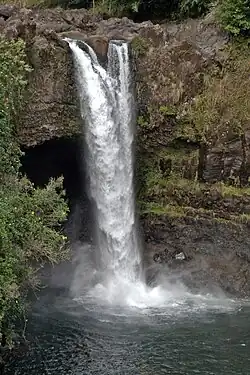| Wailuku River | |
|---|---|
 Waiānuenue (Rainbow) Falls on the Wailuku River | |
| Location | |
| Country | United States |
| State | Hawaii |
| Region | Big Island |
| Physical characteristics | |
| Source | Slopes of Mauna Kea |
| • coordinates | 19°48′26″N 155°25′13″W / 19.80722°N 155.42028°W |
| Mouth | Pacific Ocean |
• location | Hilo Bay |
• coordinates | 19°43′40″N 155°5′15″W / 19.72778°N 155.08750°W |
| Length | 28.0 mi (45.1 km) |
| Basin size | 252.2 sq mi (653 km2)[1] |
| Discharge | |
| • average | 275 cu ft/s (7.8 m3/s) |
| • maximum | 11,000 cu ft/s (310 m3/s) |
The Wailuku River is a 28.0-mile-long (45.1 km)[2] water course on the Island of Hawaiʻi in the Hawaiian Islands. It is the longest river in Hawai'i and the largest in the state by mean discharge. Its course lies mostly along the divide between the lava flows of Mauna Kea and those of Mauna Loa to the south. It arises at about the 10,800 feet (3,300 m) elevation along the eastern slope of Mauna Kea (19°48′26″N 155°25′13″W / 19.80722°N 155.42028°W). It flows generally eastward, descending steeply from the mountain and entering the Pacific Ocean at Hilo.[3]
Wailuku River State Park is located along the lower reach of the river. One section of the park includes Rainbow Falls (19°43′9″N 155°6′34″W / 19.71917°N 155.10944°W), and another section Peʻepeʻe falls and an area called the Boiling Pots (a series of small falls and pools).[4] It is also one of the deadliest bodies of water in the state, as the river is not guarded and can behave unpredictably.[5]

The lower reach of the river is used for the generation of hydroelectricity.[6] The flow at Hilo averages 275 cubic feet per second (8 m³/s) with peak flows 40 times as great. Water flow is monitored by the USGS.[7] The stream carries an average of 10 tons of suspended sediment into Hilo Bay each day, at 19°43′40″N 155°5′15″W / 19.72778°N 155.08750°W.
The river has been the site of sewage leaks[8] and is the subject of water quality research.[9] Water advisories are posted online by the State of Hawaii. There is a plan for restoration of the Hilo Bay watershed that includes characterization of the Wailuku River.[10]
In the Hawaiian language, wai means fresh water and luku means destruction, so it means essentially River of Destruction.[11] The river can rise into the trees and drop back down very fast. The high flood marks can be seen dated in concrete, on the stairs going down to the river behind the Hilo Public Library.
According to legend, the river was created in a battle between the god Maui and the lizard monster Kuna.[12]
The river is rated Class 5 white water and has been navigated by experts on kayak.[13]

References
- ↑ "Wailuku River, Hawaii" (PDF). Hawaii Watershed Atlas. Archived (PDF) from the original on February 27, 2017. Retrieved November 17, 2019.
- ↑ U.S. Geological Survey. National Hydrography Dataset high-resolution flowline data. The National Map Archived 2012-03-29 at the Wayback Machine, accessed April 28, 2011
- ↑ "Wailuku River". Geographic Names Information System. United States Geological Survey, United States Department of the Interior. September 30, 2003. Retrieved November 11, 2010.
- ↑ Wailuku River Archived 2010-02-22 at the Wayback Machine official state park web site
- ↑ "Drownings in Hawaii". Archived from the original on 2009-02-03. Retrieved 2009-01-30.
- ↑ "Hydroelectricity". www.hawaiianelectric.com. Archived from the original on 2018-02-01. Retrieved 2018-02-01.
- ↑ "USGS 16704000 Wailuku River at Piihonua, HI". waterdata.usgs.gov. Retrieved 2018-01-31.
- ↑ "Update 4: Water Quality in Hilo Bay 'All-Clear'". Big Island Now. Archived from the original on 2018-02-02. Retrieved 2018-02-01.
- ↑ "Tracy Wiegner, marine science: Assessing impact of humans on water quality in fresh and marine environments – Keaohou". hilo.hawaii.edu. Archived from the original on 2017-11-02. Retrieved 2018-02-01.
- ↑ "CWB System". Environmental Health Portal. Archived from the original on 2018-02-01. Retrieved 2018-02-01.
- ↑ Mary Kawena Pukui; Samuel Hoyt Elbert; Esther T. Mookini (2004). "lookup of Waianuenue ". in Place Names of Hawai'i. Ulukau, the Hawaiian Electronic Library, University of Hawaii Press. Retrieved November 11, 2010.
- ↑ "Legend of Wailuku Falls: Kuna, The Mo'o Monster, a mythology fiction | FictionPress". www.fictionpress.com. Archived from the original on 2018-02-01. Retrieved 2018-01-31.
- ↑ Joel Kowalski (2017-02-12), Kayaking the Wailuku River, Big Island Hawaii, archived from the original on 2021-12-22, retrieved 2018-02-01
External links